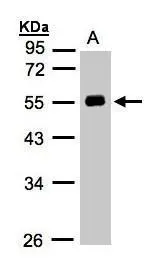
Sample(30 μg whole cell lysate) A:Hep G2 (GTX27900) 10% SDS PAGE GTX103824 diluted at 1:1000 The HRP-conjugated anti-rabbit IgG antibody (GTX213110-01) was used to detect the primary antibody.
Angiotensinogen antibody [N1C3]
GTX103824
ApplicationsImmunoFluorescence, Western Blot, ImmunoCytoChemistry, ImmunoHistoChemistry, ImmunoHistoChemistry Paraffin
Product group Antibodies
ReactivityHuman, Mouse, Rat
TargetAGT
Overview
- SupplierGeneTex
- Product NameAngiotensinogen antibody [N1C3]
- Delivery Days Customer9
- Application Supplier NoteWB: 1:500-1:3000. ICC/IF: 1:100-1:1000. IHC-P: 1:100-1:1000. *Optimal dilutions/concentrations should be determined by the researcher.Not tested in other applications.
- ApplicationsImmunoFluorescence, Western Blot, ImmunoCytoChemistry, ImmunoHistoChemistry, ImmunoHistoChemistry Paraffin
- CertificationResearch Use Only
- ClonalityPolyclonal
- Concentration1 mg/ml
- ConjugateUnconjugated
- Gene ID183
- Target nameAGT
- Target descriptionangiotensinogen
- Target synonymsANHU, SERPINA8, hFLT1, angiotensinogen, alpha-1 antiproteinase, antitrypsin, angiotensin I, angiotensin II, fetal-liver predominant transporter 1, pre-angiotensinogen, serine (or cysteine) proteinase inhibitor, serpin A8, serpin peptidase inhibitor, clade A, member 8
- HostRabbit
- IsotypeIgG
- Protein IDP01019
- Protein NameAngiotensinogen
- Scientific DescriptionThe protein encoded by this gene, pre-angiotensinogen or angiotensinogen precursor, is expressed in the liver and is cleaved by the enzyme renin in response to lowered blood pressure. The resulting product, angiotensin I, is then cleaved by angiotensin converting enzyme (ACE) to generate the physiologically active enzyme angiotensin II. The protein is involved in maintaining blood pressure and in the pathogenesis of essential hypertension and preeclampsia. Mutations in this gene are associated with susceptibility to essential hypertension, and can cause renal tubular dysgenesis, a severe disorder of renal tubular development. Defects in this gene have also been associated with non-familial structural atrial fibrillation, and inflammatory bowel disease. [provided by RefSeq]
- ReactivityHuman, Mouse, Rat
- Storage Instruction-20°C or -80°C,2°C to 8°C
- UNSPSC41116161

![Rat tissue extract (50 μg) was separated by 10% SDS-PAGE, and the membrane was blotted with Angiotensinogen antibody [N1C3] (GTX103824) diluted at 1:1000. The HRP-conjugated anti-rabbit IgG antibody (GTX213110-01) was used to detect the primary antibody. Rat tissue extract (50 μg) was separated by 10% SDS-PAGE, and the membrane was blotted with Angiotensinogen antibody [N1C3] (GTX103824) diluted at 1:1000. The HRP-conjugated anti-rabbit IgG antibody (GTX213110-01) was used to detect the primary antibody.](https://www.genetex.com/upload/website/prouct_img/normal/GTX103824/GTX103824_39946_20160107_WB_R_plasma_w_23060120_911.webp)
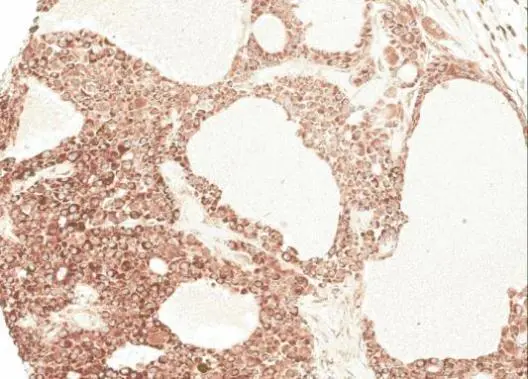
![Mouse tissue extract (50 μg) was separated by 10% SDS-PAGE, and the membrane was blotted with Angiotensinogen antibody [N1C3] (GTX103824) diluted at 1:1000. The HRP-conjugated anti-rabbit IgG antibody (GTX213110-01) was used to detect the primary antibody. Mouse tissue extract (50 μg) was separated by 10% SDS-PAGE, and the membrane was blotted with Angiotensinogen antibody [N1C3] (GTX103824) diluted at 1:1000. The HRP-conjugated anti-rabbit IgG antibody (GTX213110-01) was used to detect the primary antibody.](https://www.genetex.com/upload/website/prouct_img/normal/GTX103824/GTX103824_39946_20160107_WB_M_plasma_w_23060120_140.webp)
![Human tissue extract (30 μg) was separated by 10% SDS-PAGE, and the membrane was blotted with Angiotensinogen antibody [N1C3] (GTX103824) diluted at 1:500. The HRP-conjugated anti-rabbit IgG antibody (GTX213110-01) was used to detect the primary antibody. Human tissue extract (30 μg) was separated by 10% SDS-PAGE, and the membrane was blotted with Angiotensinogen antibody [N1C3] (GTX103824) diluted at 1:500. The HRP-conjugated anti-rabbit IgG antibody (GTX213110-01) was used to detect the primary antibody.](https://www.genetex.com/upload/website/prouct_img/normal/GTX103824/GTX103824_39946_20160107_WB_H_plasma_w_23060120_380.webp)
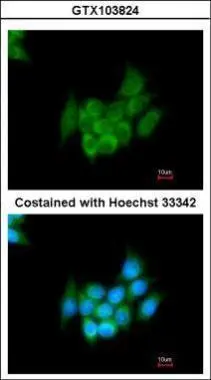
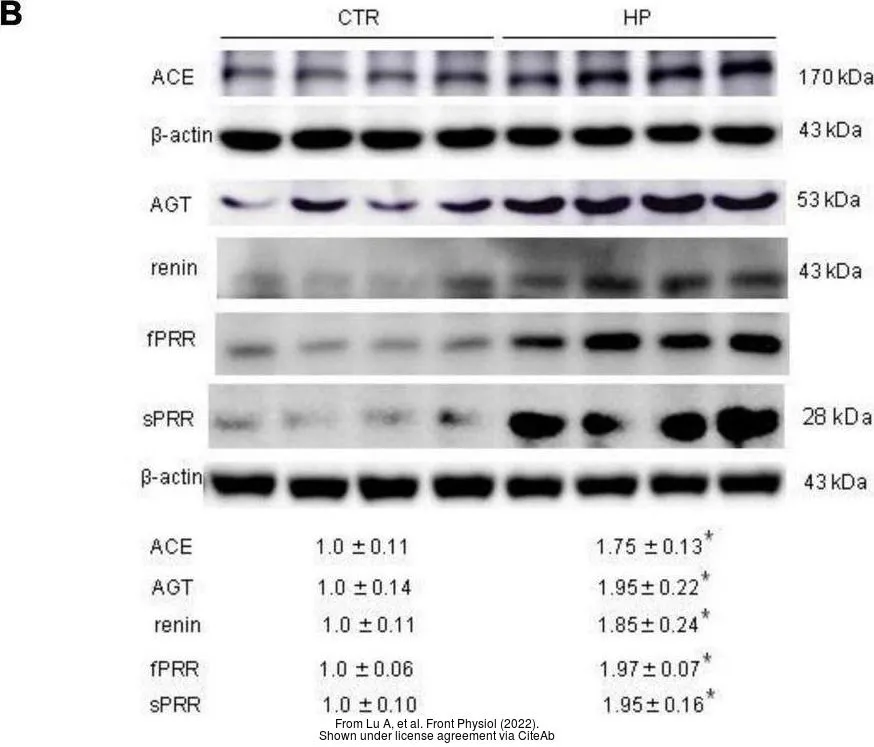
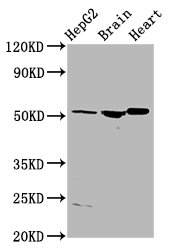


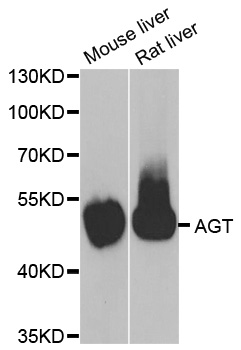


![WB analysis of human plasma using GTX83369 Angiotensinogen antibody [1B1].](https://www.genetex.com/upload/website/prouct_img/normal/GTX83369/GTX83369_20170912_WB_w_23061322_445.webp)
